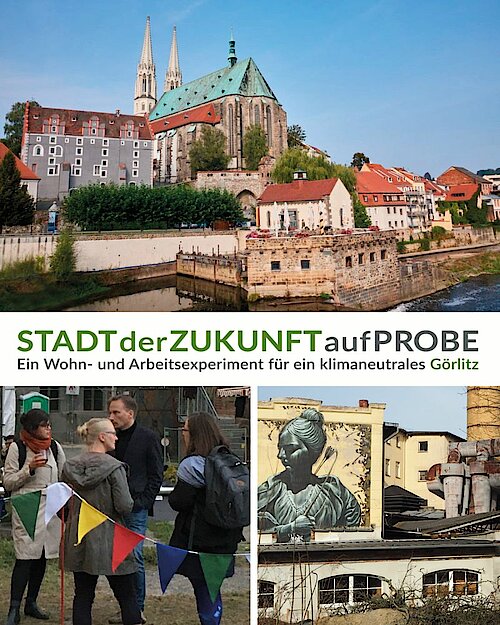In the project "Testing the City of the Future - A living and working experiment for a climate neutral city of Görlitz", the trial stay phase is now starting. Until the end of the year, the first three participants can try out Görlitz as a place to live, work and live. During their three-month stay, they will support the city with their ideas and expertise on the path to climate neutrality and more sustainability. A total of 18 of these trial stays are planned until March 2023.
"Testing the City of the Future" - First participants start their trial stay in Görlitz

So far, the project team at the Interdisciplinary Centre for Transformative Urban Regeneration (IZS) in Görlitz has received around 60 applications to participate in the project "Testing the City of the Future ". Households with one and two persons are among them, as well as families with children. Many city dwellers - especially from Berlin and Dresden - are interested in participating. However, applications were also received from other regions of Germany as well as from Poland, Austria, the USA and Brazil.
Until March 2023, a total of 18 households can live in Görlitz for three months on a trial basis. "The participants not only test living in the city, they can and should also actively shape Görlitz by contributing their ideas and expertise on the topics of sustainable urban development and climate neutrality," explains project manager Prof. Dr. Robert Knippschild. "That's why the application also required them to submit a project outline and indicate which institutions or actors in the city would be conceivable to collaborate with." One of the decisive factors in the selection of participants was whether the project idea could contribute to the ambitious goal of the city of Görlitz to become climate neutral by 2030. "We received some very interesting applications," says Robert Knippschild. "Many promise to bring real added value to the city of Görlitz, even beyond the trial stay of three months. However, some applicants cannot realise such a long stay. Unfortunately, we could not take them into account in the selection process.”
Flats of the municipal housing association KommWohnen are available free of charge for the participants. Companies and research institutions are hosts for a temporary work stay. In addition, various local initiatives provide space, for example for artistic-creative stays.
The trial stays are scientifically accompanied by the IZS. Among other things, the researchers are looking into the question of how far urban development oriented towards climate neutrality and sustainability can contribute to attracting qualified workers to smaller and medium-sized cities. Further questions are: What role can targeted in-migration play in the shift towards more sustainable ways of living and working in these cities? How do the potential newcomers influence the urban society with their commitment to climate neutrality and sustainability?
Most of the places in the project have been taken. For a few free places in the later project phase, applications are still possible until 31 October 2021. Applications can be made online via a form on the project website. A requirement for the application is the submission of a project outline.
Contact at the IZS
Prof. Dr. Robert Knippschild (project management), e-mail: R.Knippschild@ioer.de
Constanze Zöllter (project processing), e-mail: C.Zoellter@ioer.de

Background
The project is funded by the Federal Ministry of the Interior, Building and Community (BMI)/Federal Institute for research on Building, Urban Affairs and Spatial Development (BBSR) as part of their "National Urban Development Policy".
The Leibniz Institute of Ecological Urban and Regional Development (IOER), represented by the Interdisciplinary Centre for Ecological and Revitalising Urban Transformation (IZS), is implementing the project together with local institutions from business, science and civil society.
Overview of the project partners
![[Translate to English:] Leibniz Gemeinschaft](/fileadmin/user_upload/ioer_de/img/logo-leibniz-gemeinschaft.svg)
![[Translate to English:] Dresden concept](/fileadmin/_processed_/2/1/csm_logo-dresden-concept_430c661ad7.png)

